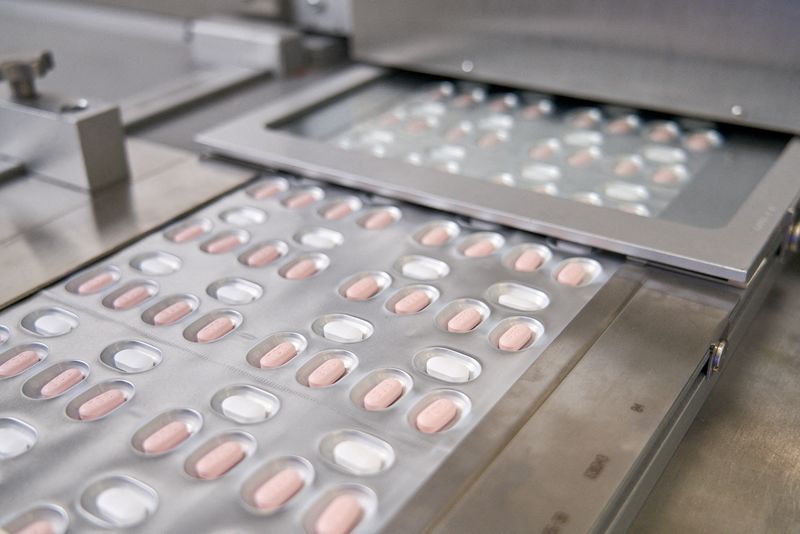By Michael Erman and Deena Beasley
NEW YORK (Reuters) -Pfizer Inc on Tuesday said its antiviral COVID-19 pill showed near 90% efficacy in preventing hospitalizations and deaths in high-risk patients, and recent lab data suggests the drug retains its effectiveness against the fast spreading Omicron variant of the coronavirus.
The U.S. drugmaker last month said the oral medicine was around 89% effective in preventing hospitalizations or deaths when compared to placebo, based on interim results in around 1,200 people. Data from its final analysis of the trial disclosed on Tuesday includes an additional 1,000 people.
Nobody in the trial who received the Pfizer (NYSE:PFE) treatment died, compared with 12 deaths among placebo recipients.
The Pfizer pills are taken with the older antiviral ritonavir every 12 hours for five days beginning shortly after onset of symptoms. If authorized, the treatment will be sold as Paxlovid.
"It's a stunning outcome," Pfizer Chief Scientific Officer Mikael Dolsten said in an interview.
"We're talking about a staggering number of lives saved and hospitalizations prevented. And of course, if you deploy this quickly after infection, we are likely to reduce transmission dramatically," Dolsten said.
Pfizer also released early data from a second study suggesting that the treatment reduced hospitalizations by around 70% in a smaller trial of standard-risk adults, including some higher-risk vaccinated people.
Pfizer said those results showed a positive trend, but were not statistically significant. They are following the results and plan to release data from the final 20% of participants in the 1,100-patient trial.The trial did not show that the drug alleviated symptoms of COVID-19 in that population.
Dolsten said he expects authorization for use in high-risk individuals from the U.S. Food and Drug Administration and other regulatory agencies soon. He does not believe an FDA advisory panel meeting will be needed.
"We're in very advanced regulatory dialogues with both Europe and the UK, and we have dialogues with most of the major regulatory agencies globally," Dolsten said.
'VERY EXCITING RESULTS'
Pfizer submitted data to the FDA last month, asking for emergency use authorization (EUA) of the drug.
"These are very exciting results," said Dr. Paul Sax, a professor at Harvard Medical School.
Sax said the FDA should try to accelerate the authorization process as much as possible, noting there are very limited treatment options for high-risk people outside of the hospital.
There are currently no oral antiviral treatments for COVID-9 authorized in the United States.
Analysts on average forecast 2022 revenue of more than $24 billion from the pill, which would more than make up for any decline in vaccine sales after 2021.
Rival Merck & Co has asked for an EUA for its antiviral pill molnupiravir. But that drug only reduced hospitalizations and deaths in its clinical trial of high-risk patients by around 30%.
Some scientists have also raised safety concerns about the potential for birth defects from the Merck drug, as well as worries that it could cause the virus to mutate.
Pfizer's treatment works differently. It is part of a class of drugs called protease inhibitors currently used to treat HIV, hepatitis C and other viruses.
Recent laboratory testing showed that activity against the protease of the Omicron variant is as "good as basically any SARS-COV-2 variant of concern," Dolsten said.
The company has said it can have 180,000 treatment courses ready to ship this year and plans to produce at least 80 million more in 2022.
Dolsten said Pfizer is looking to expand that output further as new variants, like the newly-discovered Omicron, could push the need for antivirals substantially higher. Current vaccines appear to be less effective at preventing infection with Omicron.
Pfizer, which makes one of the leading COVID-19 vaccines with German partner BioNTech, has agreed to allow generic manufacturers to supply versions of the drug to 95 low- and middle-income countries through a licensing agreement with international public health group Medicines Patent Pool (NASDAQ:POOL) (MPP). However, Dolsten said that for next year he expects the drug will be mainly produced by Pfizer.

The MPP told Reuters in a statement, that it will be "well into next year" before pills produced by generic manufacturers under its licenses will be ready for use.
The U.S. government has already secured 10 million courses of the Pfizer treatment for $5.29 billion.